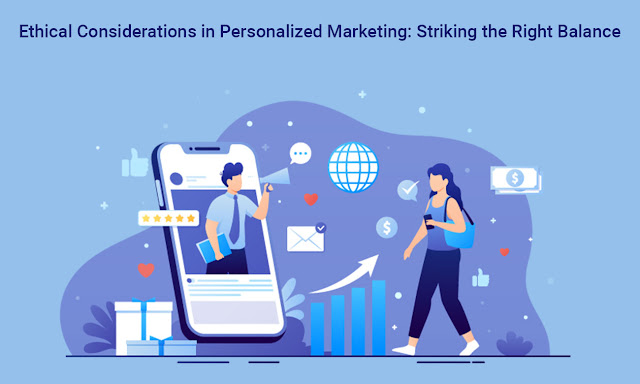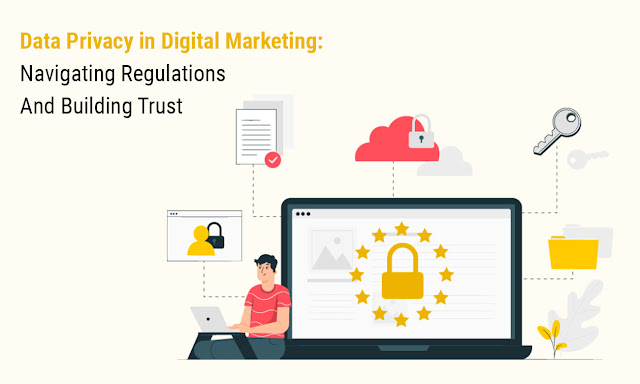Ethical Considerations in Personalized Marketing: Striking the Right Balance
Personalized marketing has become a potent force in the modern digital world, as data-driven methods guide marketing initiatives. Businesses can build strong relationships with their target audience by customizing information, recommendations, and products to individual tastes. This development does present some moral conundrums, though. A wide range of ethical issues involving data privacy and the proper use of client information are raised by the rise in customized marketing. The complex world of ethical issues relating to data privacy in personalized advertising is explored in the following article. It examines the difficulties marketers face, provides a list of best practices, analyzes the effects of more stringent data protection laws, looks at potential solutions to get around this constantly changing environment, and talks about the long-term advantages of ethical personalized marketing techniques.
The Dichotomy of Personalization
Personalization is more than just a marketing tactic anymore; it is a paradigm shift that has the power to completely change how customers engage with brands and how conversion rates work. Brands may create customized experiences by using data analytics to decode consumer behaviors, preferences, and purchasing patterns. However, as this data gold trove unfolds, a web of moral quandaries appears. Customers are demanding transparency and control over their personal information as they become more aware of how their data is collected and used.
Navigating the Ethical Maze
Transparency and Informed Consent
The lack of transparency in data collection procedures is the main ethical issue. Users frequently give up personal information without realizing it, which could then be used for reasons they are unaware of. Marketers need to put informed consent first. This entails clearly outlining data usage and getting consent in writing before collecting any data. Enhancing transparency and giving clients back control through the use of user-friendly interfaces that let them modify their data settings.
Data Security and Breaches
The obligation to protect data increases when a corporation collects more of it. Identity theft and significant financial loss are just a few of the negative effects that data breaches can have. To safeguard user data and prevent illegal access, businesses must make significant investments in effective cybersecurity solutions. A brand's defences against possible breaches can be strengthened through routine security audits, encryption methods, and proactive monitoring.
Micro-Targeting and Manipulation
Although customization aims to provide relevant content, it might unintentionally result in micro-targeting, where users are only exposed to information that is consistent with their personal views. This makes echo chambers and the propagation of false information worse. To respect user diversity and promote critical thinking, marketers must find a balance. This entails exposing people to a wider variety of content and implementing tools that introduce them to various points of view.
Algorithmic Transparency
With the rise of AI-driven personalized marketing, transparency in algorithms becomes pivotal. Brands should strive to make their data collection and decision-making algorithms transparent and understandable to users. When customers comprehend how recommendations are made, they are more likely to trust personalized experiences.
Upholding Ethical Standards in Personalized Marketing
Explicit Opt-In and Opt-Out Mechanisms
Brands should have clear opt-in and opt-out procedures that give consumers the freedom to choose whether or not their data may be used for personalisation. In addition to fostering trust, this also strengthens customer connections. Users should be able to make decisions through these mechanisms since they should be simple to use and open to all users.
Data Minimization
The concept of data reduction promotes the gathering of only the information required to create a customized experience. Excessive information gathering is not only unnecessary, but it also raises questions about potential abuse and compromise. Risks can be greatly decreased by implementing data retention policies that require the deletion of superfluous data after a specific amount of time.
Anonymization and Aggregation
Whenever possible, data should be aggregated and anonymized to shield individual identities. This approach empowers brands to extract insights without infringing on user privacy. Employing advanced anonymization techniques and using aggregated data for trend analysis can provide valuable insights while safeguarding user information.
Education and Transparency
User education is a crucial component of ethical customized marketing. Consumers need to be aware of the advantages and disadvantages of customized marketing. The collection, storage, and use of data should be explained in plain, understandable privacy policies and conditions of use. Additionally, businesses can create user-educational campaigns that teach customers how to secure their online presence and follow best practices for data privacy.
Regular Audits and Compliance
To ensure compliance with data protection requirements, it is essential to conduct routine audits of data processing processes. It's crucial to keep up with changing legal requirements and modify methods to comply with them. To ensure continuing compliance and adherence to ethical norms, brands can create specialized data protection teams or work with legal professionals.
The Regulatory Revolution: GDPR and Beyond
Regulating agencies all over the world have realized recently that issues with data privacy in the digital sphere must be addressed. The General Data Protection Regulation (GDPR) of the European Union is a significant turning point on this path. Businesses are required to obtain users' express consent, warn users of data breaches, and provide them with access to and deletion of their data. Because of the severe penalties for non-compliance, data protection is of utmost importance to enterprises.
A host of other regions have introduced similar regulations. The California Consumer Privacy Act (CCPA) and the Brazilian General Data Protection Law (LGPD) are prime examples. These laws underline the global shift towards emphasizing individual data rights and the accountability of businesses in managing this data. Companies that operate across borders must navigate this intricate web of regulations, adapting their practices to align with multiple legal frameworks.
The Benefits of Ethical Personalized Marketing
Ethical personalized marketing doesn't just mitigate risks; it also offers substantial benefits. By prioritizing user privacy and fostering trust, brands can create stronger connections with customers. Loyalty and positive brand perception are more likely to develop when users feel their data is being handled responsibly. Additionally, aligning with data protection regulations positions businesses as responsible corporate citizens, enhancing their reputation in an age where ethical considerations are paramount for consumers.
A Balancing Act of Ethics and Innovation
Ethical considerations serve as both benchmarks and obstacles in the dynamic world of personalized marketing. Striking the perfect equilibrium between tailored experiences and user privacy necessitates a meticulously designed approach. By embracing transparency, fortified security measures, and alignment with data protection regulations, businesses can cultivate trust, nurture customer loyalty, and harness the benefits of personalized marketing without compromising ethical principles. In an evolving digital landscape, the ethical dimensions of personalized marketing will continue to redefine the relationship between brands and their patrons, ensuring that innovation aligns harmoniously with ethical considerations. As marketers forge ahead, they must recognize that ethical practices are not only a responsibility but also a catalyst for sustainable success in a digital world where consumer trust is the ultimate currency. The delicate dance between data-driven strategies and ethical considerations will shape the future of personalized marketing, and those who master this balance will thrive in the ever-evolving landscape of the digital age.



Comments
Post a Comment